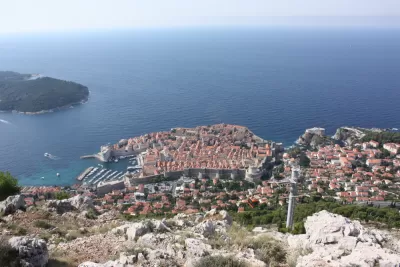Spoilers are coming.

Feargus O'Sullivan chimes in on the big question of the day: What are we to think of the fate of King's Landing?
Social media channels has been overwhelmed this week with discussion about the events in the penultimate episode of Game of Thrones, aired last week, ahead of the finale episode tonight, so it's only fair that someone finally found an urbanism angle to report.
O'Sullivan writes:
In the midst of the recent hullaballoo about “The Bells,” the penultimate episode of HBO’s Game of Thrones, something got missed in the confusion. The true star of the episode was neither a newly unsympathetic Daenerys nor her fire-breathing baby. The real focus was the city of King’s Landing itself, shown up close and in remarkable detail just at the moment when it, and its unlucky residents, were being scorched to smithereens.
According to O'Sullivan, The Bells presented Kings Landing with new detail, showing the city's "true extent" for the first time. What we see is a beautiful city, with reasonable comparisons to Dubrovnik, Valletta, Malta, Girona, and Istanbul. The effect is a "Pre-Ottoman Constantinople," according to Feargus.
All of those comparisons are familiar, however. The world learned in The Bells that Kings Landing might better described like Denmark in Shakespeare's Hamlet.
…King’s Landing may be impressive to look at, but it’s largely a miserable place to live in, and the world that created it is rotten.
This is a civilization that can construct buildings so impressive that they make soaring real-life medieval cathedrals look like shrubs in comparison. The streets beneath the citadels, however, are largely mean, dingy warrens so tightly packed with people that a jumping flea could travel the city’s circumference without ever leaving a body. In “The Bells,” incinerated spires crash from the sky and onto the terrified folk below—death by authoritarian architecture. Faced with a dragon, not even the city walls are much use to the people shown desperately trying to press through their gates to what they think is safety.
Such dichotomous realities are familiar in the real world, notes O'Sullivan, including some of the cities listed above.
FULL STORY: King’s Landing Was Always a Miserable Dump

Maui's Vacation Rental Debate Turns Ugly
Verbal attacks, misinformation campaigns and fistfights plague a high-stakes debate to convert thousands of vacation rentals into long-term housing.

Planetizen Federal Action Tracker
A weekly monitor of how Trump’s orders and actions are impacting planners and planning in America.

In Urban Planning, AI Prompting Could be the New Design Thinking
Creativity has long been key to great urban design. What if we see AI as our new creative partner?

King County Supportive Housing Program Offers Hope for Unhoused Residents
The county is taking a ‘Housing First’ approach that prioritizes getting people into housing, then offering wraparound supportive services.

Researchers Use AI to Get Clearer Picture of US Housing
Analysts are using artificial intelligence to supercharge their research by allowing them to comb through data faster. Though these AI tools can be error prone, they save time and housing researchers are optimistic about the future.

Making Shared Micromobility More Inclusive
Cities and shared mobility system operators can do more to include people with disabilities in planning and operations, per a new report.
Urban Design for Planners 1: Software Tools
This six-course series explores essential urban design concepts using open source software and equips planners with the tools they need to participate fully in the urban design process.
Planning for Universal Design
Learn the tools for implementing Universal Design in planning regulations.
planning NEXT
Appalachian Highlands Housing Partners
Mpact (founded as Rail~Volution)
City of Camden Redevelopment Agency
City of Astoria
City of Portland
City of Laramie



























